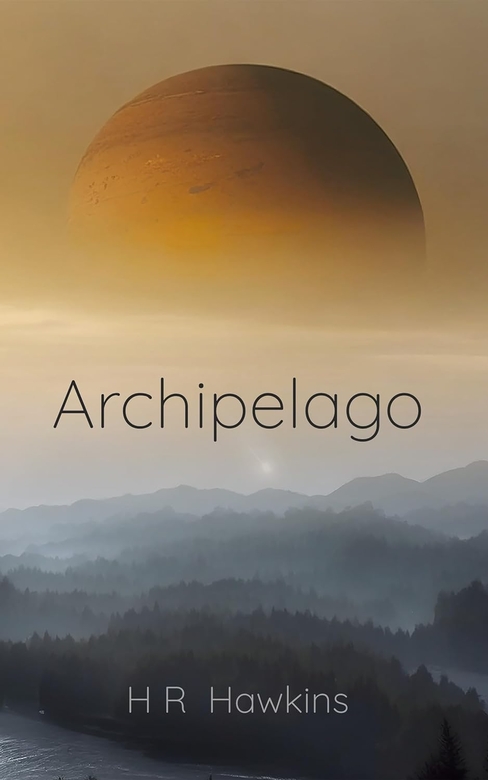A character-driven leap through a gateway to the future, Archipelago by H R Hawkins is an immersive thrill for fans of cosmic drama and technological prophecy. When a splinter civilization on the edge of the galaxy reaches out with a bizarre message after fifty years, it pulls a long-lost son back into the chaos and beauty of liberated space, for a work of top-shelf sociological science fiction.
Assigned to a high-level delegation to the distant Archipelago cluster, Ren Markov represents multiple interests seeking to re-establish contact after a violent coup cut the “Arc” off from the rest of the galactic federations. Ulterior military motives within the delegation seem undeniable, and while this diplomatic journey may give Ren a chance to learn more answers about his Arc origins, the true stakes of reconnection are higher than anyone imagines. When existential philosophies collide, it can be just as revolutionary as a war, and some in the delegation are willing to destroy dangerous ideas before they have a chance to take root.
Conflicted protagonists make the most compelling characters, and Ren is awash in guilt, secrets, curiosity, identity fluctuation, and the impossible desire for both intimacy and anonymity. Respected as a “clinically efficient assassin” in the realm of interplanetary diplomacy, Ren is tasked with leading this group of schemers, warriors, and power brokers into unknown territory. Battling on behalf of the Core Planet Federation’s Special Services sounds like an admirable calling, but the increasing absence of ethical considerations and moral idealism is beginning to wear down Ren’s truth-seeking soul. Eliminating radical factions and ideas through subterfuge, deceit, and destabilization is the bottom-line goal, even if maintaining peace and stability is the job description.
The author’s sci-fi world-building is slick and smooth, with tech advancements and a far-future lexicon organically and gradually woven into the dialogue and narration, without relying on clumsy exposition dumps. The thematic power struggle between cultivating diverse ecosystems and controlling unaligned variables plays out on many different levels within the narrative, ensuring that there are important messages beneath the prose. Political intrigue and battles for ideological control are common in sci-fi realms, but the bureaucratic and paternalistic parallels to American hegemony go even deeper in Hawkins’ writing. Nature vs technology is also a classic dichotomy of this genre, and it is explored with insightful skill on these pages.
There are some minor critiques to offer on the technical writing itself; Hawkins knows how to lavishly depict a scene, but greater economy of language could sharpen some of the visceral descriptions, rather than overloading them with too many adverbs and redundant adjectives. The prose has a tendency to be overworked, hinting and alluding more often than being straightforward in its delivery. While this can build suspense and hook readers early on, it is overused as the novel moves forward, slowing down the pace without necessarily increasing the depth of the plot or characters.
That being said, the prose as a whole is compellingly crafted, along with the story, characters, conflict, and creative scope, for a profoundly inventive sci-fi novel that explores vital questions about the present day.
Book Links
STAR RATING
Design
Content
Editing
Get an Editorial Review | Get Amazon Sales & Reviews | Get Edited | Get Beta Readers | Enter the SPR Book Awards | Other Marketing Services
























Leave A Comment